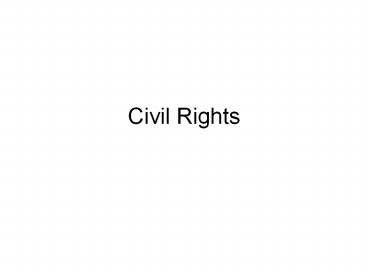Civil%20Rights - PowerPoint PPT Presentation
Title:
Civil%20Rights
Description:
Civil Rights 6. How did Mexican Americans and Native Americans assert their rights in the 1950s? Mexican Americans began peaceful protests for equal rights Native ... – PowerPoint PPT presentation
Number of Views:185
Avg rating:3.0/5.0
Title: Civil%20Rights
1
Civil Rights
2
Lets think back
- Civil War
- Fought because
- Reconstruction
- Put in place after the Civil War to remove
slavery from the south. Ended in 1877 - Discrimination
- Even though
- Jim Crow Laws
- Legal segregation that further degraded African
Americans. Laws required the separation of
blacks and whites in schools, parks, public
buildings, hospitals, and transportation systems
3
Emancipation Proclamation The Civil War was
fought over the acceptance of slavery between the
Union (North) and Confederates (South) in the
United States. On January 1, 1863, President
Lincoln declared that all persons held as slaves
in Confederate states should be freed with the
Emancipation Proclamation.
4
The reconstruction era after the Civil War
instituted three new amendments in the
Constitution for former slaves citizenship, the
right for due process, and the right to vote.
Many of the northerners were afraid that these
efforts were not enough and programs for
education and business ownership needed to be
implemented.
5
Plessy vs. Ferguson, 1896
- Supreme Court case that upheld the
separate-but-equal doctrine of Jim Crow Laws. - Law was hard to enforce.
- African American schools and other facilities
were rarely if ever made equal.
6
(No Transcript)
7
Plessy vs. Ferguson Clip
8
Jackie Robinson
- First baseball player to play in a white league
- Despite many situations of prejudice against him,
Jackie behaved with dignity and played well. - Named Rookie of the Year in 1947
- Voted MVP in 1949
- Fostered pride in African Americans around the
country.
9
(No Transcript)
10
Video Clip Jackie Robinson
11
1. Why did Branch Rickey, the general manager of
the Brooklyn Dodgers choose Jackie Robinson to
break, the color line in baseball?
- Robinson had a record of standing up against
racial injustice
12
2. In 1954 what did the supreme Court rule in
Brown v. Board of Education?
- Segregation in public schools no longer would be
allowed
13
Brown vs. Board of Ed
14
Rosa Parks Clip
15
3. What role did Rosa Parks play in the struggle
for equal right?
- She refused to move to the back of the bus was
arrested for violating the segregation laws of
Montgomery, Alabama.
16
In Response. . .
- For over a year, Blacks boycotted the buses.
- They carpooled and walked through all weather
conditions
17
Many were arrested for an illegal boycott
including their leader. . .
18
4. Who became the spokesperson for the Montgomery
bus boycott?
- Martin Luther King Jr.
19
http//www.africanaonline.com/Graphic/rosa_parks_b
us.gif
- While the NAACP fought in the courts, MLKs
organization led the boycott.
20
Kings sacrifice
- King was arrested thirty times in his 38 year
life. - His house was bombed or nearly bombed several
times - Death threats constantly
21
Success!
22
Montgomery Bus Boycott
23
School Integration
- The attitude of many schools after the 1954 Brown
decision was like
Come Make Me!
24
Delayed Action
25
5. Why did President Eisenhower send the Arkansas
National Guard to Little Rock?
- To enforce the desegregation of schools at Little
Rock High school
26
Federalism
- When Federal troops are sent to make states
follow federal laws, this struggle for power is
called federalism. - The Civil Rights Movement was mostly getting the
federal government to make state governments to
follow federal law.
27
Little Rock 9
- In 1957, Governor of Little Rock, Arkansas
declared that he would not enforce integration in
the schools. - Posted Arkansas National Guard troops at the door
of the high school and turned away nine African
American students who tried to attend.
28
Little Rock, Arkansas 1957
29
Little Rock 9
- President Eisenhower responded by placing the
National Guard troops under his command. - The troops escorted the students in to the
schools to keep them physically safe. - Troops were not allowed to interact with
students, though, and students within the high
school openly threatened, mocked, and verbally
attacked the Little Rock 9.
30
Little Rock 9 Clip
31
(No Transcript)
32
(No Transcript)
33
(No Transcript)
34
6. How did Mexican Americans and Native Americans
assert their rights in the 1950s?
- Mexican Americans began peaceful protests for
equal rights - Native Americans also fought for better treatment
from the federal govt - BOTH WANTED EQUALITY































